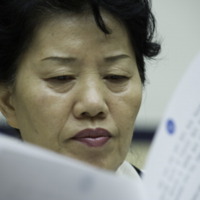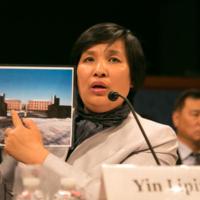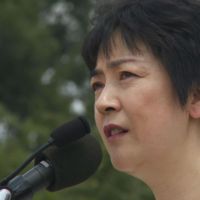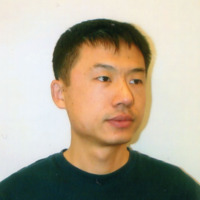
Hello, my name is Songhwa Han, and I came to the United States with my two daughters in 2008 as refugees, following the passage of the North Korean Human Rights Act by the U.S. Congress in 2004.
For the lowest class people in North Korea, they have a most desperate and earnest plea. That plea is to be freed and liberated to freedom and human rights from the worst suffering and pain of starvation. I want to thank the U.S. Government for hearing our plea, for hope, and giving us freedom. I want to just describe very briefly my reasons for leaving North Korea.
I escaped with my two daughters from North Korea for the first time in 1998. Before defection from North Korea, my family consisted of eight people. My mother and my two-month-old newborn baby son died from starvation, and my oldest daughter, who was 18 years old at the time, left home to find food and never came back. To this day I do not know of her whereabouts or what happened to her.
I had another five-year-old son who I had to leave at an acquaintance’s home before I escaped to China. I promised my son, if you just sleep for five nights I will be back with rice and candy and I will come back to get you.
Afterward, my five-year-old son, who was suffering from malnutrition, was kicked out of the house I had put him in and died while waiting and crying out, “Mommy, sister, when are you coming back?” He cried and cried, and died in a grass field. This news was delivered to me by someone I had hired to go and bring my son to China.
My husband was arrested and sent to jail for the crime of crossing the Tumen River and going to China and bringing back a sack of rice, when what he had done was simply to go to China to find food for his children and save them, who had slowly over time grown weaker and weaker from starvation. He died while incarcerated in prison from the severe punishment he received.
Afterward, my family was labeled as anti-state traitors for having crossed over to China and the North Korean police and the Bowibu, or the national or domestic security agents, came to look for us in our countryside village home. They came to kick us out of the village, for me to take the remaining family members and move away to another place.
Our family had devoted ourselves to the Party and to the dear leader, but contrary to the police in the United States, instead of protecting the citizens the North Korean police yelled and threatened to burn down our house if we did not move out.
I could no longer beg for help or for mercy, and I decided right then and there rather than staying put and starve to death, even if we died trying to go find our way to freedom, I decided to seek out freedom.
My one sole wish was to feed my children just one meal of white rice, and decided that I would never suffer from starvation or be unfairly mistreated, and therefore took my seven-year-old daughter, who was malnourished and was not growing up properly, put her in a sack and carried her, and held my older daughter’s hand and leaned on one another and each other and crossed the waist-high currents of the Tumen River and safely escaped from North Korea.
After escaping to China and living in fear for almost 10 years, during that period we were forcibly repatriated four times. During one of those forced repatriations, I would just like to share about my experience from the time I was forcibly repatriated during the summer of 2003.
First of all, once a North Korean defector was handed over by the Chinese police to the North Korean Bowibu, or the security agents, one had to become an animal.
Second, the defectors were repatriated or ordered by the North Korean guards that, “You are all dogs from now on, so therefore lower your head and move around by only looking at the ground.” The prisoners are handcuffed and chained to one another, and if the slightest noise is made the prisoners are beaten with rifle butts.
After the interrogation is finished at the Bowibu, the prisoners are taken to a reformed hard labor camp, where I was sent. We were forced to work from 5 o’clock in the morning until late at night, and after dragging our dead-tired bodies back from work we were only giving a fist-sized corn/rice ball to eat, and until 11 o’clock in the evening we were required to participate in self-reflection and self-criticism group meetings and forced to sing patriotic martial songs.
We would then spend the rest of our night sitting in front of one another and picking off the ticks and lice from our clothes and our hair, and then sleep for a few hours, and then wake up early in the morning to the wake-up call and then get dragged out for more labor. These types of punishments were given out to misdemeanor criminals.
These punishments were repeated for as long as six months, and like men who would die from malnutrition and starvation and the women prisoners who collapsed from fatigue and could not get up again, both women and men alike had to carry heavy logs up to the mountainside. If a prisoner became injured there was no recourse for medicine or for medical care.
In the wintertime there was no proper footwear available, so pieces of cloth and strings would be used to cover up the feet. While working in the snow, many would come down with frostbite, but we could not stop work and had to continue working, and also continue to work the following day.
Sometimes the men had to shovel human waste from the latrines with their own bare hands. The women prisoners would then carry the human waste, mixed with dirt, on their backs and carry the load into the fields. So for the crime of going to China for only wanting to live and not die from starvation, North Korean refugees who are repatriated by China become prisoners and end up suffering under crushing labor, doing construction work or coal mining work, and become sick or injured, or worse, suffer in misery and pain and die while working under horrendous conditions. The wretched and poor North Korean refugees continue to suffer like this, and the misery is never ending.
For the crime of betraying the nation, in the Bowibu, the domestic or national security agency prisons, the North Korean refugee men who were forcibly repatriated were beaten with steel pipes and countless people died from beatings inflicted on them, where arms and legs were broken.
I, myself, was beaten in the head for the crime of having gone over to China, and I was beaten so severely that my skull still has pieces of bone imbedded in my head. Besides this injury, because I was beaten so severely and punched around so much, my eyes became swollen and one of my eardrums ruptured. To this day I am hard of hearing in one ear.
While we were suffering from thirst, there was no water to drink and the prisoners would end up drinking foul water from the water tanks or wells and come down with colitis, and die without any care or treatment given to them.
North Korean refugees, if they are miraculously able to survive and be released from prison or from the reform labor camps, will attempt to escape from North Korea even if it means death if caught again.
Through this hearing today I earnestly plead and beg of you, refugees of other countries have been accepted in the United States numbering in the tens of thousands of people or more. But after the North Korean Human Rights Act passed in 2004, only about 130 North Korean refugees have been granted asylum in the United States.
These defectors, who have been separated from their parents, separated from their children, these defectors who have no place to go, these North Korean refugees who are shuddering in fear in China right now and desiring freedom in the free world, whether it be South Korea or the United States, desire to be rescued and accepted into freedom.
If 100 North Korean refugees were accepted after the Human Rights Act passed we would have more than 1,000 North Korean refugees in the United States by now. Those who long to go to the United States and who travel to Thailand and were incarcerated in the detention camps in Thailand, who long to go to the United States, because the wait period was so long, waiting for many months, they decided to change their destination to South Korea and ended up going to South Korea instead.
I sincerely hope that the United States will accept the North Korean refugees, like South Korea. Being accepted into the United States is the wish of many North Korean refugees in earnest, and on their behalf I make this request to all of you here today. I pray that for those North Korean refugees who are in the period of uncertainty, that you will deal with China intensely and help rescue the North Korean refugees in China right now. Please help us, the North Korean refugees. Thank you.
Narrative as told at a Hearing Before the Congressional-Executive Commmission on China, on China's Repatriation of North Korean Refugees, 112th Congress, Second Session, March 5, 2012, Washington DC.


